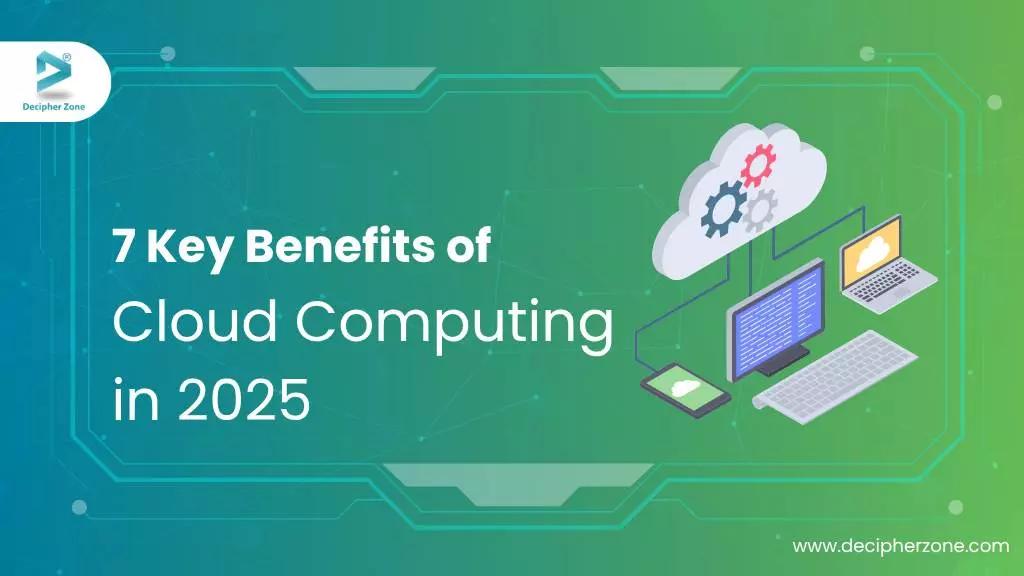Quick Summary: Cloud computing has matured from a cost-saving strategy to the backbone of modern digital transformation. In 2025, it powers AI workloads, secure hybrid operations, and global collaboration. This article explores seven major benefits from scalability and security to sustainability showing how cloud adoption fuels growth and resilience for businesses worldwide.
Cloud computing has come a long way from being a technical buzzword. In 2025, it sits at the center of nearly every digital initiative from AI-driven automation to sustainable IT infrastructure. Businesses no longer ask why they should move to the cloud, but how fast they can.
Read: software development
Let’s explore the seven key benefits that make cloud computing indispensable today.
1. Cost Efficiency
One of the biggest reasons companies are investing in cloud solutions is cost efficiency. Instead of heavy upfront spending on hardware, they now adopt pay-as-you-go models that scale with usage.
According to Gartner, over 70 % of enterprises in 2025 report cost reductions after migrating to the cloud. The cloud eliminates hardware depreciation and maintenance costs while improving operational agility.
Businesses can even leverage FinOps practices to monitor and optimize cloud expenditure in real-time ensuring every dollar spent delivers measurable value.
Read more: Cloud Application Development
2. Scalability & Agility
Markets change overnight and so must technology. Cloud platforms like AWS, Azure, and Google Cloud let organizations instantly scale resources up or down.
Whether it’s an e-commerce surge during festive sales or a financial system handling billions of transactions, cloud elasticity ensures uninterrupted performance.
Many companies now prefer multi-cloud and hybrid-cloud setups, combining public and private environments for flexibility and compliance.
Read more: Multi-Cloud vs Hybrid Cloud

3. Security & Data Protection
Security once used to be a major concern with cloud computing; today, it’s one of its strongest pillars.
Cloud providers invest billions annually in encryption, threat monitoring, and compliance frameworks such as ISO 27001 and GDPR. Beyond that, businesses integrate zero-trust architectures and AI-driven threat detection for layered protection.
By 2025, even highly regulated sectors like banking, healthcare, and defense are migrating critical workloads to the cloud with confidence.
Read next: Security Service Edge (SSE)
4. Collaboration Without Boundaries
Remote and hybrid work have made collaboration tools like Google Workspace, Microsoft Teams, and Slack business essentials. Cloud computing connects teams from any part of the world in real time, allowing co-editing, data sharing, and instant updates.
This digital accessibility bridges geographic gaps and keeps productivity consistent. For startups, it means competing with larger players on equal footing.
See also: Hire Developers for Your Next Cloud Project
5. Disaster Recovery & Business Continuity
Downtime is expensive every minute counts. Cloud-based backup and disaster-recovery systems ensure that data remains available even in the event of hardware failures, natural disasters, or cyberattacks.
Modern solutions use geo-redundant storage and automated replication to restore operations within minutes. This resilience has become a core advantage, especially for industries like logistics, finance, and healthcare where continuity is critical.
Read: What is Data Discovery?
6. Flexibility & Innovation
Cloud computing has evolved into an innovation engine. It enables experimentation with AI, machine learning, IoT, and blockchain without huge investments.
For example, retailers use AI models on cloud infrastructure to forecast demand, while manufacturers connect IoT sensors to monitor equipment health in real time.
The agility of cloud platforms lets businesses test, iterate, and launch new ideas quickly a vital advantage in today’s fast-moving markets.
Explore: Scaling Digital Transformation Efforts
7. Sustainability
Sustainability is no longer optional. By consolidating workloads into efficient data centers, cloud providers reduce global energy waste.
In 2025, major vendors like Google and Microsoft are running on 100 % renewable energy and committing to carbon-negative operations. Businesses that adopt cloud computing indirectly reduce their own carbon footprint contributing to a greener future.
Read: Renewable Energy Software Development
Conclusion
In 2025, cloud computing is no longer just an IT strategy it’s a business imperative. It drives innovation, secures data, saves costs, and accelerates sustainability goals.
Organizations that fully embrace cloud solutions are not just keeping up with digital transformation they’re defining its pace.
Discover how our team at Decipher Zone Technologies helps businesses build custom cloud solutions that scale globally while staying secure and cost-efficient.
Frequently Asked Questions
Q1. How does cloud computing help small businesses in 2025?
It gives small businesses enterprise-grade technology without heavy investment. With pay-per-use pricing, even startups can access secure storage, automation tools, and global infrastructure affordably.
Q2. Is the cloud safe for sensitive data?
Yes. Leading cloud platforms offer end-to-end encryption, compliance certifications, and advanced identity management. Data remains safer than most on-premise setups.
Q3. Can cloud computing support AI and machine learning workloads?
Absolutely. The cloud offers high-performance computing (HPC), scalable GPUs, and managed AI services — making it ideal for training models and deploying AI apps at scale.
Q4. Does cloud adoption really reduce carbon emissions?
Yes. Shared infrastructure uses energy efficiently. Major providers use renewable power, helping businesses achieve sustainability goals faster.
Q5. What are the future trends in cloud computing?
Expect the rise of sovereign clouds, AI-managed operations, and serverless architectures enabling developers to focus entirely on innovation rather than maintenance.
Author Profile: Mahipal Nehra is the Marketing Manager at Decipher Zone Technologies, specializing in content strategy, and tech-driven marketing for software development and digital transformation.
Follow us on LinkedIn or explore more insights at Decipher Zone.

